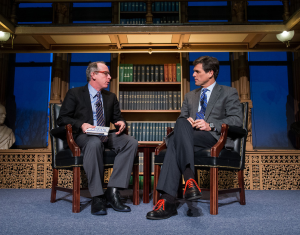
Chairman of the board of directors of the Special Olympics Timothy Shriver (right) reflects on his experiences with serving the disabled.
Timothy Shriver, chairman of the board of directors of the Special Olympics, shared reflections on his new book, “Fully Alive: Discovering What Matters Most,” and his love of community service for others Thursday evening in Riggs Library.
Shriver is a social leader, educator, activist, film producer and business entrepreneur. After a long career as an educator, Shriver became president and CEO of Special Olympics in 1996, leading a national movement that promotes the inclusion and respect for people with intellectual disabilities. Special Olympics organizes more than 70,000 competitions per year, serving more than 4.4 million families in over 170 countries.
Center for Religion, Peace and World Affairs Senior Fellow at the Paul Elie moderated the event, and University President John J. DeGioia introduced Shriver.
“Tonight’s conversation will gain unique insight into Tim’s book, as our two guests explore how our spiritual and religious lives sustain and enrich our imaginations, our sense of purpose and how faith shapes and is even shaped by the work we do in our daily lives,” DeGioia said.
Shriver first interacted with mentally disabled children his own age at Camp Shriver, the summer camp founded by Shriver’s mother, Eunice Kennedy Shriver, at their Maryland home. Shriver’s mother was passionate about combatting the stigma surrounding intellectual disability due to the trauma of seeing her own sister Rosemary, who suffered from intellectual disabilities, continuously rejected by society.
In part Shriver wanted to tell his story because he said he felt like people misunderstood his work.
“People would say, ‘Oh you’re involved in Special Olympics, that’s so nice, that’s so sweet what you do for those people … you must be a Catholic,’” Shriver said. “In some ways it was humiliating to hear all that. It was well-intentioned, those ideas, but it was so disparaging of the athletes and the experience I was having. The experience I was having was cracking my heart open, my mind open. It was challenging me to rethink everything.”
Shriver said that he believes the world is now shifting to become more understanding of those with disabilities.
“I do feel like we are at a point in time as a culture where we are trying to get out of the old models of social justice that emphasize moral imperatives, ethical responsibility, guilt, duty, transactional relationships and into ones that are much more rooted in human equality,” Shriver said.
After college, Shriver was consumed by questions about the source of pain in the world and what his role was in combating that pain. During this time Shriver found comfort in his faith, focusing on self-emptying silent prayer. Through reflection Shriver came to a realization that he had to discover God living within himself.
“I really thought my job was to become like other people,” Shriver said. “It never occurred to me until then that my mission was to be me.”
Shriver started to ask if he was educating his heart as much as his mind and found that his heart was being educated through Special Olympics.
“It occurred to me, I’m getting schooled in the heart,” Shriver said. “I’m finding different ways in which power and joy emerge, different ways of identifying suffering, different ways of feeling solidarity with people. This is amazing.”
Shriver said he experienced that gift of joy in gyms across the country where Special Olympics events took place.
“It’s as though you have crossed a fear barrier, the judgment is removed,” Shriver said. “It’s all of a sudden like someone has pulled back the veil and said, ‘This is the place where we play without judgment; we keep score, but not to evaluate; we win and lose without any degradation of the opponent; no one is knocked down.’”
Shriver also spoke about the darker side of intellectual disability. He told stories about health screenings among the athletes, which revealed that up to 50 percent of the athletes screened randomly have the wrong glasses or no glasses because they are not thought of as mattering enough to see well.
“The athletes of Special Olympics come from a place of enormous vulnerability, dependence, trust, openness and discrimination,” Shriver said. “They have experienced the most vicious forms of cultural and social discrimination that exist in the world today, most of it unnoticed. They know something of the pain of exclusion. And yet once invited into an environment in which the context is not judgmental they are almost invariably, passionately welcoming, which is an extraordinary irony.”
Shriver said “Fully Alive” is not a book about Special Olympics; it is a book about what the athletes taught him. He said he hopes silence and service are the two lessons that will be taken away from the discussion, adding that the only way to find yourself is to give yourself away.
Hannah Collins (COL ’18) attended the event and said she was touched by the talk.
“People have been telling me a lot lately, similar to what [Shriver] said — that you have to learn to love yourself in order to love everyone and everything unconditionally — so I feel like that’s being reinforced here,” Collins said.
Georgetown Student Athlete Advisory Committee Special Olympics Co-Coordinator Sophia Gargicevich Martins de Almeida (COL ’15) said she wished for more involvement from the Georgetown community.
“Right now it’s a small group of people that [are involved in the Special Olympics] here, but I hope that Georgetown can utilize everything they have a little bit more efficiently in the future … it’s exciting to see there are other people interested,” Gargicevich Martins de Almeida said.














